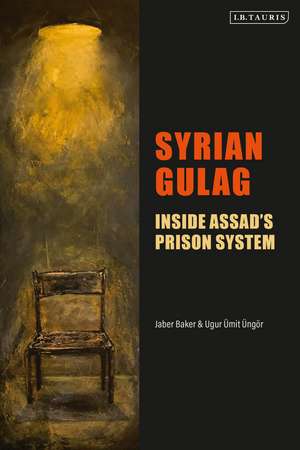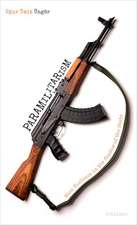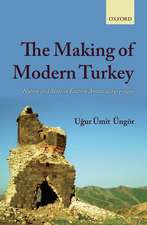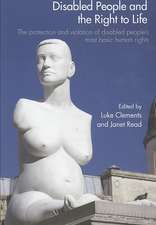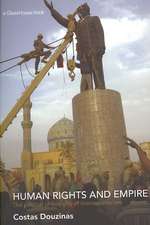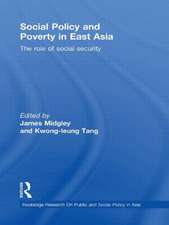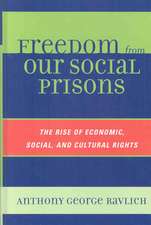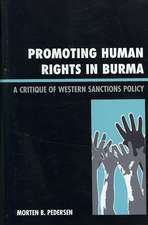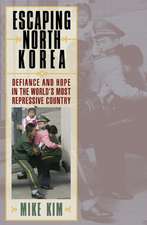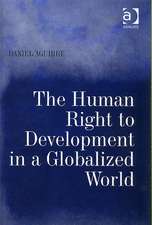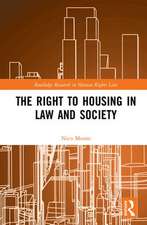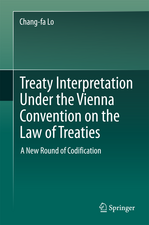Syrian Gulag: Inside Assad’s Prison System
Autor Jaber Baker, Ugur Ümit Üngören Limba Engleză Hardback – 4 oct 2023
Preț: 126.68 lei
Preț vechi: 211.94 lei
-40% Nou
Puncte Express: 190
Preț estimativ în valută:
24.24€ • 25.37$ • 20.18£
24.24€ • 25.37$ • 20.18£
Carte disponibilă
Livrare economică 11-25 martie
Livrare express 22-28 februarie pentru 131.98 lei
Preluare comenzi: 021 569.72.76
Specificații
ISBN-13: 9780755650200
ISBN-10: 0755650204
Pagini: 416
Ilustrații: 80 b&w images and 24 col. images
Dimensiuni: 156 x 234 x 32 mm
Greutate: 0.84 kg
Editura: Bloomsbury Publishing
Colecția I.B.Tauris
Locul publicării:London, United Kingdom
ISBN-10: 0755650204
Pagini: 416
Ilustrații: 80 b&w images and 24 col. images
Dimensiuni: 156 x 234 x 32 mm
Greutate: 0.84 kg
Editura: Bloomsbury Publishing
Colecția I.B.Tauris
Locul publicării:London, United Kingdom
Caracteristici
Reveals meticulous details of one the most brutal prison systems in the world
Notă biografică
Ugur Ümit Üngör is Professor of Holocaust and Genocide Studies at the University of Amsterdam, the Netherlands, and the NIOD Institute for War, Holocaust, and Genocide Studies, Holland. He has won several academic awards and held visiting positions in Dublin, Vancouver, Budapest, Toronto, and Los Angeles. His most recent publication is Paramilitarism: Mass Violence in the Shadow of the State (2020).Jaber Baker is a documentary filmmaker, novelist and human rights activist. Between 2002 and 2004 he was held in a military prison in Syria. He has 16 years' experience of research and specialises in the Syrian prison system.
Cuprins
Introduction1. Mezze: Political Elites and Incarceration2. Intelligence Bureaus3. Tadmur4. The First Military Prison: Saydnaya5. Civil Prisons for Justice and Reconciliation6. ConclusionAppendix 1 Some Main charactersAppendix 2 Tortures and their toolsAppendix 3 Kitchen and Eating UtensilsAppendix 4 DiseasesAppendix 5 MedicinesAppendix 6 Prison JargonBibliographyNotes
Recenzii
In Syrian Gulag, Jaber Baker and Ugur Ümit Üngör present the first detailed overview of the prison system. They have carried out more than 100 interviews with surviving detainees, as well as former prisoner workers and many other eyewitnesses. They have also drawn upon a huge amount of archival material. The results are profoundly shocking. In more than 30 years of book reviewing, this is the most horrifying volume I have read.
Syrian Gulag . is the most comprehensive and systematic single-volume book on Syria's imprisonment system of terror.
This book is an extraordinary achievement. Drawing on extensive primary source material, Baker and Üngör reveal in an unprecedented level of detail the sheer magnitude of Syria's massive internal security agencies, the bureaucratization of torture on an industrial scale, and the extent to which fear is a constant presence in the lives of ordinary Syrians. The book is unsparing in its accounts of survivors of torture and techniques of torture, and all the more powerful for including them. It makes an unimpeachable case for brutality and violence as defining attributes of the Assad regime. It is also a sobering rebuttal to those seeking the regime's "normalization." It should be required reading for all who have an interest in Syria, human rights, and states as perpetrators of mass violence.
This study is the first in any language to begin to map the Syrian prison archipelago. It is an urgently necessary and timely insight into the workings of Syria's Assad regime.
As some European states have started forcing refugees back to Syria, this book is a grim reminder that for its unfortunate citizens, the violence preceded the use of rockets and barrel bombs, and the threat to their life remains undiminished. What makes this book invaluable is its panoramic picture of Syria's vast repressive apparatus that the uprising failed to dislodge. What makes this book frightening is that unlike Dante, who had to use his prodigious imagination to describe hell, the hell described herein comes from the direct experience of survivors who lived through its various circles of torment. In painstaking detail, Jaber Baker and Ugur Ümit Üngör have mapped the hellish institutions, sites, and methods through which the Syrian regime has preserved its rule by extinguishing hope and humanity. And through meticulous documentation they've also created an instrument through which the perpetrators may one day be held to account.
Syria's dungeons have long kept its secrets; places so foreboding and cruel that few dared mention what happens inside them. The war has changed that. Once taboo topics are now being discussed far from the broken country, where former prisoners now in exile are detailing a killing and torture machine that rivals the Khmer Rouge for the scale of its savagery. In Syrian Gulag, Üngör and Baker open the gates of one of modern history's most infamous prison systems and empower a brutalised people to tell their stories.
Syrian Gulag . is the most comprehensive and systematic single-volume book on Syria's imprisonment system of terror.
This book is an extraordinary achievement. Drawing on extensive primary source material, Baker and Üngör reveal in an unprecedented level of detail the sheer magnitude of Syria's massive internal security agencies, the bureaucratization of torture on an industrial scale, and the extent to which fear is a constant presence in the lives of ordinary Syrians. The book is unsparing in its accounts of survivors of torture and techniques of torture, and all the more powerful for including them. It makes an unimpeachable case for brutality and violence as defining attributes of the Assad regime. It is also a sobering rebuttal to those seeking the regime's "normalization." It should be required reading for all who have an interest in Syria, human rights, and states as perpetrators of mass violence.
This study is the first in any language to begin to map the Syrian prison archipelago. It is an urgently necessary and timely insight into the workings of Syria's Assad regime.
As some European states have started forcing refugees back to Syria, this book is a grim reminder that for its unfortunate citizens, the violence preceded the use of rockets and barrel bombs, and the threat to their life remains undiminished. What makes this book invaluable is its panoramic picture of Syria's vast repressive apparatus that the uprising failed to dislodge. What makes this book frightening is that unlike Dante, who had to use his prodigious imagination to describe hell, the hell described herein comes from the direct experience of survivors who lived through its various circles of torment. In painstaking detail, Jaber Baker and Ugur Ümit Üngör have mapped the hellish institutions, sites, and methods through which the Syrian regime has preserved its rule by extinguishing hope and humanity. And through meticulous documentation they've also created an instrument through which the perpetrators may one day be held to account.
Syria's dungeons have long kept its secrets; places so foreboding and cruel that few dared mention what happens inside them. The war has changed that. Once taboo topics are now being discussed far from the broken country, where former prisoners now in exile are detailing a killing and torture machine that rivals the Khmer Rouge for the scale of its savagery. In Syrian Gulag, Üngör and Baker open the gates of one of modern history's most infamous prison systems and empower a brutalised people to tell their stories.
